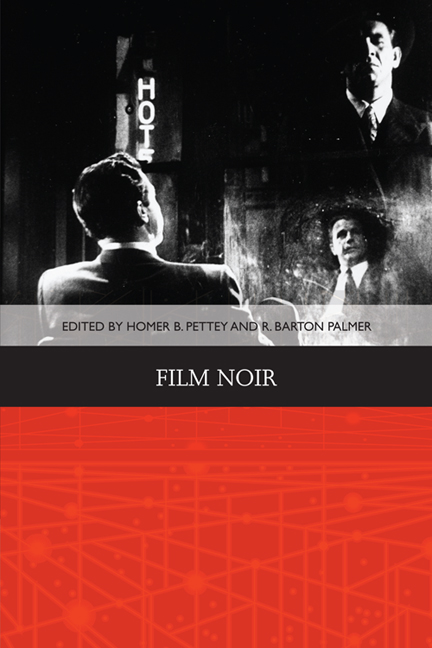Book contents
- Frontmatter
- Contents
- List of Illustrations
- Acknowledgements
- Notes on the Contributors
- Introduction: The Noir Turn
- 1 The Cinema of Uncertainty and the Opacity of Information from Louis Feuillade's Crime Serials to Film Noir
- 2 Warning Shadows: German Expressionism and American Film Noir
- 3 Hard-boiled Tradition and Early Film Noir
- 4 Cold War Noir
- 5 Noiring the Pitch: The Conflicted Soundtracks of Out of the Past, The Blue Gardenia and The Long Goodbye
- 6 Split Screen: Sound/Music in The Stranger/Criss Cross
- 7 Gender and Noir
- 8 The Subversive Shade of Black in Film Noir
- Postscript: A History of Our Writing about Film Noir
- Selected Book Chapters on Film Noir
- Selected Film Noir Books
- Selected Guide to Film Noir
- Index
3 - Hard-boiled Tradition and Early Film Noir
Published online by Cambridge University Press: 05 August 2016
- Frontmatter
- Contents
- List of Illustrations
- Acknowledgements
- Notes on the Contributors
- Introduction: The Noir Turn
- 1 The Cinema of Uncertainty and the Opacity of Information from Louis Feuillade's Crime Serials to Film Noir
- 2 Warning Shadows: German Expressionism and American Film Noir
- 3 Hard-boiled Tradition and Early Film Noir
- 4 Cold War Noir
- 5 Noiring the Pitch: The Conflicted Soundtracks of Out of the Past, The Blue Gardenia and The Long Goodbye
- 6 Split Screen: Sound/Music in The Stranger/Criss Cross
- 7 Gender and Noir
- 8 The Subversive Shade of Black in Film Noir
- Postscript: A History of Our Writing about Film Noir
- Selected Book Chapters on Film Noir
- Selected Film Noir Books
- Selected Guide to Film Noir
- Index
Summary
Partly it may be due to the sense that money as an accounting mechanism submits pleasures to an unforgiving scrutiny, like that of traditional morality. Most of all it has to do with money's anonymity, the sense that the trust it buys is somehow fraudulently acquired, being based on impersonal rules rather than personal understanding. Sexuality is the area of human life most permeated by the ideal of willing and autonomous exchange between partners motivated by convergent desire, and yet it is also the one most poisoned by … more indirect and mercenary motive. The indirect masquerading as the direct is likewise at money's very heart.
Paul Seabright, The Company of StrangersHard-boiled detective fiction and film noir are almost exclusively aligned with the desires for money and sex, two mirrored conditions of a fragile human economy. The Maltese Falcon (1941), Double Indemnity (1944), and Murder, My Sweet (1944) certainly rely upon economic issues in their adaptations from the Hammett, Cain and Chandler novels. All three novels and their film adaptations deal with sexual exchanges for material possessions: Brigid's erotic enticements to Spade for the mysterious falcon; Phyllis's promise of amorous reward for the monetary compensation from the indemnity policy; and Mrs Grayle's lubricious invitations to Spade in order to guard her jaded secret and thereby her social position. Of course, this concupiscence as capital outlay is hardly limited to feminine desires in film noir, since Spade, Neff and Marlowe engage in this kind of self-interested manipulation for profit. Emerging during the era of the international Great Depression and the rise of global fascism, film noir often addresses the complex, paradoxical interrelationship of economics and passion. Plots and thematic structures of proto-noirs and noirs of the 1940s and well into the next decade reveal the matrix of dependency between money and sex, among them: The Big Sleep (1940), Danger Signal (1945), Fallen Angel (1945), Mildred Pierce (1945), Out of the Past (1947), Railroaded (1947), Dark Passage (1947), Thieves’ Highway (1949), Too Late for Tears (1949), Dark City (1950), The Asphalt Jungle (1950), Gun Crazy (1950) and The Big Heat (1953). Excess – financial, sexual, material – serves as a central motif in all of these films as it had in the development of the hardboiled detective genre.
- Type
- Chapter
- Information
- Film Noir , pp. 58 - 79Publisher: Edinburgh University PressPrint publication year: 2014

